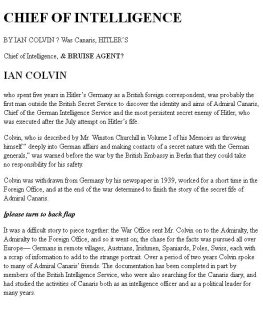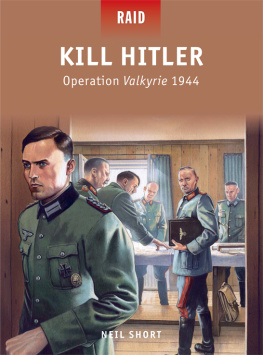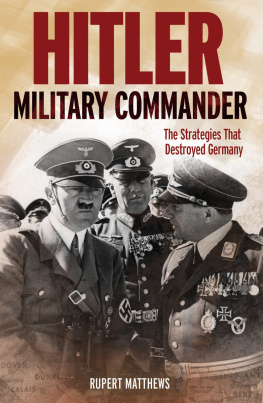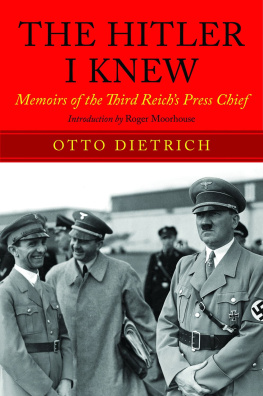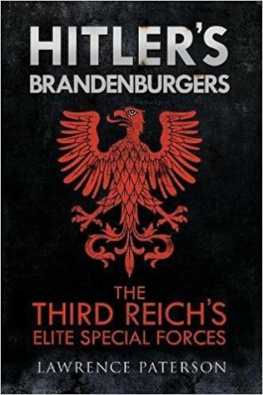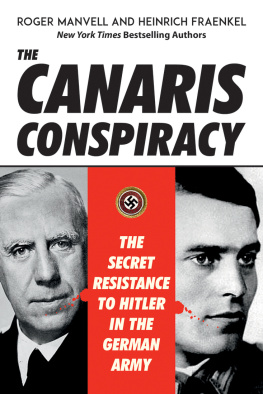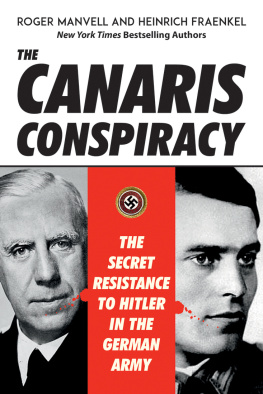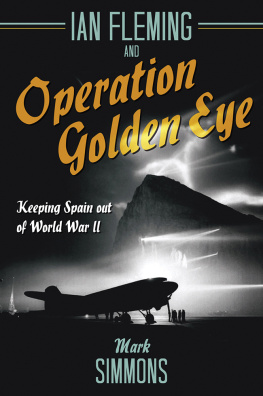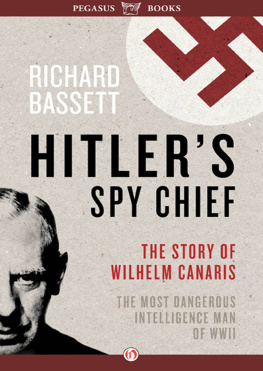CHIEF OF INTELLIGENCE
BY IAN COLVIN
Was Canaris, HITLERS
Chief of Intelligence, & BRITISH AGENT?
IAN COLVIN
who spent five years in Hitlers Germany as a British foreign correspondent, was probably the first man outside the British Secret Service to discover the identity and aims of Admiral Canaris, Chief of the German Intelligence Service and the most persistent secret enemy of Hitler, who was executed after the July attempt on Hitlers life.
Colvin, who is described by Mr. Winston Churchill in Volume I of his Memoirs as throwing himself deeply into German affairs and making contacts of a secret nature with the German generals, was warned before the war by the British Embassy in Berlin that they could take no responsibility for his safety.
Colvin was withdrawn from Germany by his newspaper in 1939, worked for a short time in the Foreign Office, and at the end of the war determined to finish the story of the secret life of Admiral Canaris.
[please turn to back flap
[ please turn to back]
At first he hoped that this might be achieved by way of a crushing failure in Nazi diplomacy, which would utterly discredit the regime. So he did his best to inform the British Government of Germanys military weakness during the period of the Czech crises (using Kleist as his intermediary), and to urge Chamberlain to call Hitlers bluff. So did General Beck: he told Kleist, Through yielding to Hitler, the British Government will lose its two main allies here, the German General Staff and the German people. If you bring me from London positive proof that the British will make war if we invade Czechoslovakia, I will make an end of this regime. By proof he meant, he explained, an open pledge to assist Czechoslovakia in the event of war. The tragic story of the failure of Kleists mission is told again. All that came out of it was a strong letter of warning from Churchill (not then in the Government, of course). None the less, Canaris did what he could with this, and by September 14th General von Witzleben, General Haider, Count Helldorf and others had their plans ready to arrest Hitler on his return from Berchtesgaden. Then came the news of Chamberlains first flight to Germany. The plot collapsed, and Canaris was temporarily discredited with his allies.
He never again played quite so leading a role in the plots of the General Staff against Hitler. He was kept informed of them, but stood a little apart, preferring to injure the Nazis in other ways. It was he, we are told, who informed the British of Hitlers plan to launch the Luftwaffe on London the moment Chamberlain made his broadcast declaration of war. Subsequently Hitler was persuaded not to make this possibly costly gesture which would be of no military importance at that stage. Canaris was unable to get news through of the change of plan: hence that air-raid warning which London received at 11.15 a.m. on September 3rd, 1939. He warned us of the date of the invasion of Norwaya warning which the Norwegian Legation in Berlin omitted to pass on because it was thought to be top incredible to be true. He warned us of the date of the invasion of the Low Countries, but though the warning on this occasion deprived the Germans of the advantage of tactical surprise, it did not hold them up long. Of much greater importance than all this is his masterly ^handling of Franco, whom he succeeded in keeping out of the war when Hitler was exerting his greatest pressure (at the time of the Hendaye Conference). Outwardly urging Hitlers case, he secretly fed Franco with information which stiffened his morale, gave him talking points with which to delay a decision, and so on: an exercise in truly mediaeval guileand a victory which, Mr. Colvin suggests, ranks with the other great turning points of the war. And possibly we owe Canaris one other immense debt. When the war was beginning to turn against Hitler, he ordered Canaris to arrange for the assassination of Churchill: Canaris took no step to carry out the order.
It was inevitable that Canaris should ultimately fall under suspicion:
[please turn to inside front flap]
It was a difficult story to piece together: the War Office sent Mr. Colvin on to the Admiralty, the Admiralty to the Foreign Office, and so it went on; the chase for the facts was pursued all over Europe Germans in remote villages, Austrians, Irishmen, Spaniards, Poles, Swiss, each with a scrap of information to add to the strange portrait. Over a period of two years Colvin spoke to many of Admiral Canaris friends. The documentation has been completed in part by members of the British Intelligence Service, who were also searching for the Canaris diary, and had studied the activities of Canaris both as an intelligence officer and as a political leader for many years.
CHIEF OF INTELLIGENCE
by
IAN COLVIN
LONDON
VICTOR GOLLANCZ LTD
Copyright 1951 by Ian Colvin
To
H. G. ONeill
Strategicus who said Why not attempt a full study of Canaris?
MADE AND PRINTED IN GREAT BRITAIN BY PURNELL AND SONS, LTD. (T.U.)
FOREWORD
THE INTELLIGENCE GAME
How good was the British Intelligence Service during the Second World War? Did it compare with the legendary reputation of the Secret Service in the past? Did we outmanoeuvre the German Abwehr? Did we know what country Hitler intended to attack, and when? It seemed that at the beginning of the war the British Government was surprised by a series of unexpected aggressions.
I was casting these questions over one of the Under-Secretaries of State at lunch when the German wars were over and he rose to the subject, remarking with a certain emphasis: Well, our Intelligence was not badly equipped. As you know, we had Admiral Canaris, and that was a considerable thing. Hitlers Intelligence Chief a British agent? Although I had occasion over a number of years, as a correspondent of British newspapers in Berlin, to catch glimpses of the workings of the Chief of Intelligence Services of the German Armed Forces, it would have no more occurred to me to describe him as a British agent than I would have described Tallyrand as an agent of Castlereagh. Yet the Under-Secretary said we had Canaris emphatically, and his point of view was so fascinating that I have begun this study of Canaris by quoting it.
As I walked away from lunch that day it seemed that this must be the best-kept secret of the war. I wondered to what extent the Services Information and News Departments, usually so helpful in historical research, would respond to enquiries about Admiral Canaris.
You have chosen a difficult subject for us, said Brigadier Lionel Cross at the War Office. Why not ask the Admiralty? After all, he was a sailor. At length I found an officer in the Admiralty who had made a study of Canaris. I am afraid I cannot help you much on the aspect which interests you, he admitted, and I dont think anyone can. I tried the Foreign Office.
We have a large amount of material on Admiral Canaris all of it secret, said the Foreign Office. We could not contemplate allowing you to examine it yourself, and we cannot spare the time of anyone here to look through these papers for you.
But, I objected, historians are given access to a great number of documents of recent date.
We see your point, but we dont see our way to help you.
Was it so deep a mystery? I asked Lord Vansittart if he could say anything of Canaris as a friend of the British. I only knew of him as an efficient intelligence officer, he answered.

